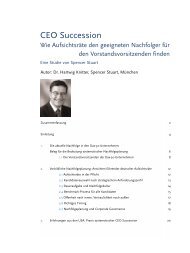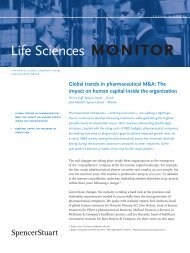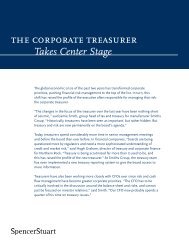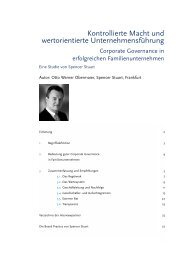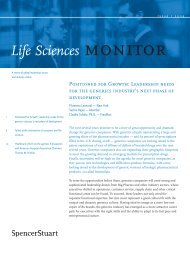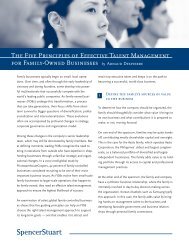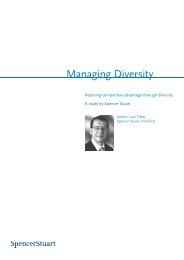Growing a global, client-focused consulting business - Spencer Stuart
Growing a global, client-focused consulting business - Spencer Stuart
Growing a global, client-focused consulting business - Spencer Stuart
You also want an ePaper? Increase the reach of your titles
YUMPU automatically turns print PDFs into web optimized ePapers that Google loves.
<strong>Growing</strong> a <strong>global</strong>,<br />
<strong>client</strong>-<strong>focused</strong> <strong>consulting</strong> <strong>business</strong><br />
An interview with Mark Foster, group chief executive,<br />
Management Consulting & Integrated Markets, Accenture<br />
Mark Foster<br />
Accenture is a <strong>global</strong> management <strong>consulting</strong>, technology services and outsourcing<br />
company, listed on the NYSE. It had net revenues of US$19.7 billion<br />
for the fiscal year ended Aug. 31, 2007 and employs more than 158,000 people<br />
in 49 countries. Accenture helps its <strong>client</strong>s perform at the highest levels so<br />
they can create sustainable value for their customers and shareholders. It has<br />
extensive relationships with the world’s leading companies and governments,<br />
working with organizations of all sizes — including 91 of the Fortune Global<br />
100 and two-thirds of the Fortune Global 500.<br />
Mark Foster joined Accenture in 1983 and became a partner in 1994. As group<br />
chief executive, Managing Consulting & Integrated Markets, he is a member of<br />
Accenture’s executive leadership team.<br />
Mark recently spoke to <strong>Spencer</strong> <strong>Stuart</strong> consultant Rob Wilder about how<br />
Accenture is developing its solutions for <strong>client</strong>s in the light of <strong>global</strong>ization<br />
and the quickening pace of organizational change.<br />
Mark Foster at a glance<br />
><br />
><br />
Mark Foster has overall responsibility for the development of the company’s<br />
management <strong>consulting</strong> capabilities, which include the customer relationship<br />
management, finance & performance management, human performance,<br />
strategy, and supply chain management service lines. Additionally, he has<br />
oversight of all Accenture industry programs as well as its High Performance<br />
Business Initiative, through which Accenture provides <strong>client</strong>s with a unique<br />
blend of <strong>business</strong> capabilities across its three growth platforms — Management<br />
Consulting, Systems Integration and Technology, and Outsourcing.<br />
Mark was previously group chief executive of Accenture’s products operating<br />
group. He leads Accenture’s involvement with the World Economic Forum: in<br />
this capacity he serves as chairman of the non-executive board of the Global<br />
Health Initiative against HIV/AIDS, TB and Malaria. He is also a member of<br />
the board of the International Business Leaders Forum of the Prince of Wales<br />
Trust, which supports <strong>business</strong> development in the developing world.
Q & A with Mark Foster<br />
What is your view on the relationship<br />
between IT services and software and how<br />
the industries are converging?<br />
Accenture’s model straddles the whole spectrum of<br />
management <strong>consulting</strong>, IT services and software,<br />
as well as outsourcing, and these fields are continuing<br />
to converge. What’s driving our <strong>business</strong> at<br />
the moment is our <strong>client</strong>s’ need to improve their<br />
performance in the face of increased <strong>global</strong>ization<br />
and customer-centricity. Leveraging <strong>global</strong> scale<br />
and being very close to customers are two critical<br />
areas of change for organizations, which in turn<br />
fuel growth in the <strong>business</strong> change management<br />
<strong>consulting</strong> industry and information technology<br />
systems solutions backbones. And, as people<br />
disaggregate their value chains in different ways,<br />
the demand for outsourcing grows.<br />
In terms of how IT services relates to software,<br />
it’s clear that, as more and more functionality is<br />
being built into software, incorporating some of<br />
the IT services that were once provided separately,<br />
productivity is rising. However, a new range of<br />
complex IT-related issues is emerging with the next<br />
level of integration and connectivity. The next wave<br />
of change in IT services is coming from areas such<br />
as Web 2.0, web enablement, open source, the<br />
convergence of technologies and Service-Oriented<br />
Architecture. Change needs to be purposeful, part<br />
of an overall strategy to improve <strong>business</strong> performance,<br />
so what we try to do is help our <strong>client</strong>s use<br />
these technologies to respond to the issues of<br />
competition, <strong>global</strong>ization and their customercentricity.<br />
Are the larger enterprise <strong>client</strong>s moving<br />
away from complex, bespoke deals with<br />
you, or are you moving towards managing a<br />
portfolio of services?<br />
There are still plenty of large, transformational deals<br />
to be done across the spectrum, although it is quite<br />
hard to predict when they will come along. The<br />
nature of the issues <strong>client</strong>s face, and their need for<br />
pace, certainty and strategic flexibility, will inevitably<br />
drive some to adopt our services in the form of<br />
big, complex, integrated deals. With my integrated<br />
markets responsibility, I make sure that we bring<br />
all the best pieces of Accenture together in order to<br />
serve <strong>client</strong>s in complex deals. We expect there to be<br />
a continuing flow of these, whether they involve total<br />
enterprises or key functional parts of organizations.<br />
The bread and butter of our <strong>business</strong> is what I call<br />
significant, complex change in a division, function or<br />
area — projects worth between £20–50 million —<br />
which compared to the big transformational deals<br />
mentioned above, are somewhat medium-scale. We<br />
also deliver point solutions to solve a specific <strong>business</strong><br />
issue: very <strong>focused</strong> insights, using our systems<br />
integration <strong>consulting</strong>, technology <strong>consulting</strong> or<br />
management <strong>consulting</strong> services. And then there are<br />
what I like to call the service support models: staff<br />
augmentation, and basic application outsourcing<br />
representing another layer of our value proposition.<br />
Our <strong>business</strong> has always been a portfolio of services<br />
and it’s quite good from a risk mitigation strategy<br />
that we’re not entirely dependent on the big deals,<br />
though obviously we need a number of those to<br />
maintain our scale and momentum.<br />
Is Accenture looking over its shoulder at other<br />
major software players, even those offering<br />
different elements of the value chain?<br />
We have <strong>focused</strong> on India and have been extremely<br />
successful here, despite the competition from<br />
Indian companies neutralizing the first wave of<br />
attack on our value chain. Our objective has been to<br />
connect an Indian capability to our <strong>global</strong> network<br />
that is delivery- and outcome-based, rather than<br />
simply about time and materials. Infosys and Tata<br />
are showing signs that they will assume accountability<br />
for delivery as opposed to simply offering a<br />
cheaper cost-per-head; we fully expect them to build<br />
the capability to do that <strong>global</strong>ly, which will put competitive<br />
pressure on us. However, we are moving<br />
up the value chain all the time. We have been the<br />
only Western-based company to grow our <strong>business</strong><br />
organically in India and to properly take the Indians
Q & A with Mark Foster<br />
on in their home territory with a degree of success.<br />
But we have to stay vigilant, particularly if they move<br />
into areas like management <strong>consulting</strong>, which they<br />
will try to do. It’s going to be a struggle for them,<br />
but they will have some natural advantages which<br />
we respect, including their access to a great talent<br />
pool of very bright people.<br />
The environment in which Oracle and SAP operate<br />
is always of interest to us, not so much because<br />
it’s a competitive threat per se, but because the<br />
new wave of solutions arising from those platforms<br />
— and indeed from Web 2.0 and service-oriented<br />
architecture technologies — create more areas for<br />
us to become expert in and help us serve <strong>client</strong>s in<br />
unique and differentiated ways. It does mean that<br />
some of the things we would have done five to ten<br />
years ago are now inside the software, but that’s<br />
life — things move on. As complexity, process and<br />
integration issues become critical for organizations,<br />
so we gain opportunities.<br />
How has the thinking of your larger<br />
enterprise <strong>client</strong>s evolved over the years?<br />
Most of them are still putting in their Enterprise<br />
Resource Planning backbones, which is easier said<br />
than done. We help guide them through organizational<br />
and operating model barriers particularly<br />
when done on a <strong>global</strong> basis; this is a huge wave<br />
of activity and will remain so for four to six years.<br />
Of course, some companies got there early, maybe<br />
because their industries were more <strong>global</strong> or they<br />
were just ahead of the curve. They are now starting<br />
to build on top of those platforms and think about<br />
how to use the internet more effectively, how they<br />
can create more flexible models for interacting with<br />
their <strong>business</strong> partners, multi-channel customers,<br />
and so on. As a result, CIOs and the rest of the<br />
C-suite are now worrying about analyzing and drawing<br />
insight from their vast databases of information.<br />
The value-added services area of IT is going to be<br />
critical for us.<br />
After the dot com bubble burst, the<br />
Accenture strategy group retrenched,<br />
along with a number of other Accenture<br />
<strong>consulting</strong> practices, but it has now come<br />
back with force. What has this been a<br />
response to?<br />
During the <strong>consulting</strong> downturn in the early part of<br />
this decade we re<strong>focused</strong> ourselves on two things.<br />
First, we built a scale outsourcing <strong>business</strong> in BPO<br />
and applications that went from 15 to 40 percent of<br />
our practice in three years. Second, we reinvented<br />
our systems integration practice by creating a truly<br />
<strong>global</strong> delivery network which was plugged into<br />
Latin America and Manila as well as India. Today we<br />
have 44 centres in 30 cities.<br />
What <strong>client</strong>s need in terms of <strong>business</strong> advice and<br />
services goes beyond systems integration, technology<br />
and outsourcing. We have always had a strong<br />
management <strong>consulting</strong> capability, but this now<br />
needs to be ramped up to match the scale of the<br />
issues that our <strong>client</strong>s are facing. The <strong>consulting</strong><br />
market is very hot right now. The audit firms have<br />
come back into the marketplace very strongly off<br />
the back of the Sarbanes-Oxley, and the traditional<br />
strategy consultants have carried on in the direction<br />
of operational <strong>consulting</strong>. We remain in a sweet<br />
spot in what I call operating model change —<br />
organizational change, executional strategy and the<br />
connection between management <strong>consulting</strong> and<br />
technology systems.<br />
Clients have to be equipped to be high performing<br />
in a world in which economic activity comes from<br />
multiple locations around the globe, flowing in<br />
every direction. With our <strong>global</strong> footprint we are<br />
uniquely placed to take advantage of this trend,<br />
so long as we can deepen our skills; developing<br />
industry-specific as well as platform points of view<br />
is important for us.
Q & A with Mark Foster<br />
How do you see Accenture’s position with<br />
the big strategy firms moving aggressively<br />
into the marketplace?<br />
It depends on the area. Take McKinsey, for example.<br />
We respect them and believe they have a big part<br />
to play in the world — indeed, they are the catalyst<br />
for a lot of our <strong>business</strong> development. Their work<br />
often prompts an executive team to change strategy,<br />
but since they do not handle the execution side of<br />
things, this is where we come in. Because we are<br />
so firmly grounded in the pragmatics of execution,<br />
running <strong>client</strong>s’ HR, finance or supply chain<br />
operations, etc., we bring unique and valuable<br />
insights to <strong>client</strong>s. Our style of <strong>consulting</strong> is more<br />
organizationally collaborative, partnering not just<br />
with the <strong>client</strong>’s senior team but also with the rest<br />
of the organization — that’s a very different model.<br />
We are credible because we are playing the same<br />
game as our <strong>client</strong>s. We are a public company, we<br />
are leading <strong>global</strong>ization and facing the rigours of<br />
clear reporting; like our <strong>client</strong>s, we are having to<br />
re-engineer our own talent force and realign it with<br />
the <strong>global</strong> economy. From a <strong>consulting</strong> perspective I<br />
find myself talking to <strong>client</strong>s about what we’re doing<br />
in our own $17 billion <strong>global</strong> enterprise. They see us<br />
as a model.<br />
When you became Accenture everybody was<br />
watching to see what was going to happen.<br />
Now the <strong>business</strong> is going well and you<br />
have a great brand. Do you think going<br />
public has improved your credibility and<br />
brand with <strong>client</strong>s?<br />
In some cases it has, but not all <strong>client</strong>s really<br />
understand what’s happened or how far we’ve<br />
come. Our own transition has been important for<br />
us; we have learnt a great deal just by having to do it<br />
ourselves. We understand the pressures of being a<br />
listed <strong>business</strong>: every day we deal with the markets,<br />
with analysts, balancing shareholder returns with<br />
internal imperatives, which is what every publicly<br />
traded company in the world has to do.<br />
Many of our competitors still run on partnershipbased<br />
models and have different frames of reference<br />
for some of the things we’re doing. Being a corporate<br />
player of scale is part of our differentiation and<br />
at the heart of our <strong>business</strong> is a success story.<br />
Do you find that collaboration is an issue,<br />
particularly between your various <strong>business</strong>es?<br />
With a number of different agendas at play<br />
do you find the collegiality is still there?<br />
It’s still there. Certainly, the leadership team is closely<br />
connected. And as we continue to scale our <strong>business</strong>,<br />
we are conscientious about removing barriers to<br />
collaboration, focusing on teamwork, and integrating<br />
diverse points of view from across the <strong>business</strong>. In<br />
my role, I not only drive our key differentiation — our<br />
High Performing Business Initiative, but I also have<br />
responsibility to ensure we have layered offerings<br />
that glue us together so that our teams continue<br />
to make connections with each other by sharing<br />
knowledge and expertise with other groups and<br />
actively developing internal and external networks —<br />
that’s still a strong, natural tendency at Accenture.<br />
What is your growth strategy, and does<br />
it mainly involve organic growth or<br />
acquisition?<br />
Both. We have announced our strategy to spend<br />
money on M&A. We have to find the right properties<br />
to buy across all of our growth platforms, in<br />
<strong>business</strong> process outsourcing (BPO), management<br />
<strong>consulting</strong> and systems integration. We have made<br />
a small and selective number of acquisitions in specific<br />
areas (our “tuck-in” strategy)…We are feeling<br />
more confident following the successful integration<br />
of Capgemini’s North American healthcare <strong>consulting</strong><br />
practice in 2005, and have since made a couple<br />
of other small strategic acquisitions to enhance our<br />
services and capabilities — for example, with our<br />
recent acquisition of the George Group.
Q & A with Mark Foster<br />
What is Accenture’s strategy for acquiring<br />
and managing talent over the next three to<br />
five years?<br />
Each of our <strong>business</strong>es has a talent and human capital<br />
strategy. We will remain the place that has high<br />
quality people who bring outstanding intellectual<br />
content to everything we do. We will be focusing on<br />
industry experts and raising the bar so that we have<br />
more people who can go toe-to-toe in the board<br />
room with our <strong>client</strong>s. We will bring more people<br />
into operational <strong>consulting</strong> so that we can help<br />
<strong>client</strong>s re-engineer critical processes, and massively<br />
enhance our <strong>global</strong> insights. Our dominant experience<br />
is what you might call the ‘Western capitalist’<br />
perspective of a high performance organization, but<br />
as we start to do more work with Islamic, Chinese,<br />
African and Latin American organizations, we need<br />
to deepen our understanding of different <strong>business</strong><br />
cultures and have greater insights to offer. We have<br />
been in India since 1987, and China since 1988, but<br />
we want to aggressively grow our <strong>business</strong> in these<br />
and other fast-growing economies.<br />
The systems integration practice will have a strong<br />
focus on technology skills and capabilities, ideally<br />
bringing on board world-class architects who understand<br />
how these new technologies are used to effect<br />
<strong>business</strong> change. We need people who can manage<br />
complex, end-to-end programmes, and people who<br />
can run and manage operational excellence in the<br />
area of BPO.<br />
Would Accenture consider bringing in senior<br />
executives without a <strong>consulting</strong> background<br />
to work alongside <strong>client</strong>s in a given sector?<br />
Yes, I think we would, although the transition from<br />
being a <strong>business</strong> person to being a consultant is not<br />
straightforward. The ideal person would be someone<br />
like a transformation director who has successfully<br />
driven a change programme from within<br />
a large organization. There are also many people<br />
who have gone back into <strong>business</strong> from <strong>consulting</strong>.<br />
Our own alumni and alumni from other firms are<br />
attractive prospects — people who have <strong>consulting</strong><br />
experience and insight, but also the pragmatism<br />
that comes from having practical <strong>business</strong> experience.<br />
We will continue to lean towards people with<br />
industry experience, although of course we will carry<br />
on building talent and recruiting on a massive scale.<br />
This year alone at Accenture we’re hiring 60,000<br />
people.
About <strong>Spencer</strong> <strong>Stuart</strong><br />
<strong>Spencer</strong> <strong>Stuart</strong> is one of the world’s leading executive search <strong>consulting</strong> firms.<br />
Privately held since 1956, <strong>Spencer</strong> <strong>Stuart</strong> applies its extensive knowledge of industries,<br />
functions and talent to advise select <strong>client</strong>s — ranging from major multinationals<br />
to emerging companies to nonprofit organizations — and address their<br />
leadership requirements. Through 51 offices in 27 countries and a broad range of<br />
practice groups, <strong>Spencer</strong> <strong>Stuart</strong> consultants focus on senior-level executive search,<br />
board director appointments, succession planning and in-depth senior executive<br />
management assessments. For more information on <strong>Spencer</strong> <strong>Stuart</strong>, please visit<br />
www.spencerstuart.com.<br />
IT & Business Services Practice members<br />
Cathy Anterasian — Silicon Valley<br />
Anne Austin — Melbourne<br />
Anjali Bansal — Mumbai<br />
David Beuerlein — Dallas<br />
James Buckley — Silicon Valley<br />
Victor Burk — Houston<br />
Wai Leong Chan — Singapore<br />
Roger Clarkson — Toronto<br />
Jeffrey Constable — Philadelphia<br />
Stephanie Davis — Los Angeles<br />
Jason Hancock — Boston<br />
Joji Hara — Tokyo<br />
Jeff Hauswirth — Toronto<br />
Timothy Hoffman — Hong Kong<br />
John Keller — New York<br />
Randall Kelley — Dallas<br />
Bret Kidd — Dallas<br />
Bruce Lachenauer — Orange County<br />
Michael Lamb — Sydney<br />
Anthony Laudico — Stamford<br />
Richard Lin — Shanghai<br />
Michael Lynch — Silicon Valley<br />
Jian Ma — Beijing<br />
Sharon Miles — Melbourne<br />
Simmons Patrick Jr. — Atlanta<br />
Terry Price — Dallas<br />
Nayla Rizk — Silicon Valley<br />
Sharon Rudy — Toronto<br />
Tom Scanlan — New York<br />
Bruno Serey — Paris<br />
Jonathan White — San Francisco<br />
Rob Wilder — London<br />
Susan Young — Sydney<br />
Wolfgang Zillessen — Frankfurt<br />
©2007 <strong>Spencer</strong> <strong>Stuart</strong>.<br />
All rights reserved. For information about copying, distributing and displaying this work, contact permissions@spencerstuart.com<br />
Amsterdam<br />
Atlanta<br />
Barcelona<br />
Beijing<br />
Bogota<br />
Boston<br />
Brussels<br />
Budapest<br />
Buenos Aires<br />
Chicago<br />
Dallas<br />
Dubai<br />
Frankfurt<br />
Geneva<br />
Hong Kong<br />
Houston<br />
Johannesburg<br />
Leeds<br />
London<br />
Los Angeles<br />
Madrid<br />
Manchester<br />
Melbourne<br />
Mexico City<br />
Miami<br />
Milan<br />
Minneapolis/St. Paul<br />
Montreal<br />
Munich<br />
Mumbai<br />
New York<br />
Orange County<br />
Paris<br />
Philadelphia<br />
Prague<br />
Rome<br />
San Francisco<br />
Santiago<br />
Sao Paulo<br />
Shanghai<br />
Silicon Valley<br />
Singapore<br />
Stamford<br />
Stockholm<br />
Sydney<br />
Tokyo<br />
Toronto<br />
Vienna<br />
Warsaw<br />
Washington, D.C.<br />
Zurich



